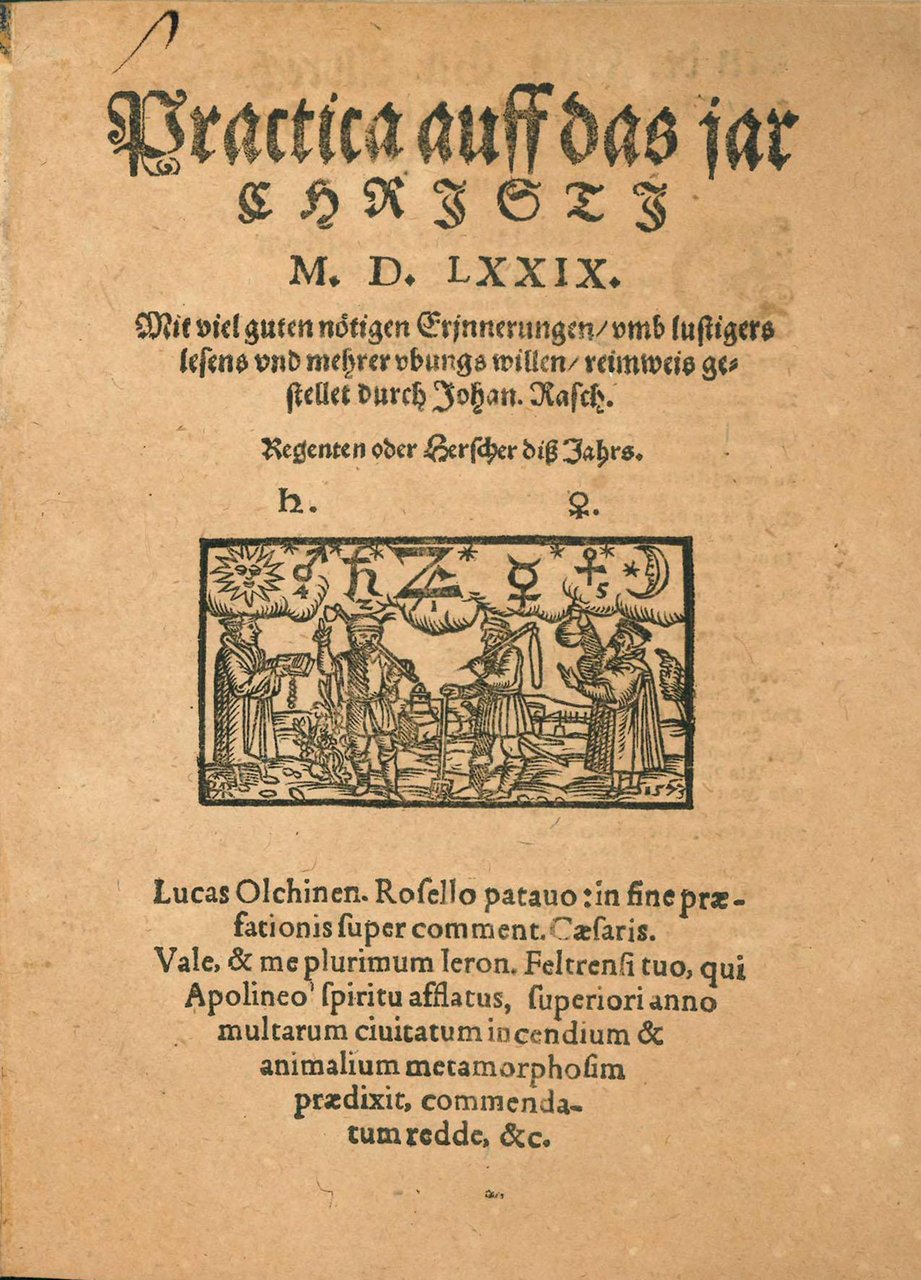


Livres anciens et modernes
RASCH, Johann (1540-1612)
Practica auff das jar Christi M. D. LXXIX. Mit viel guten nötigen Erjnnerungen umb lustigers lesens und mehrer ubungs willen reimweis gestellet [...]
N.pl., n.pr., n.d. [München, Adam Berg, 1578?],
1500,00 €
Govi Libreria Antiquaria
(Modena, Italie)
Les frais d'expédition corrects sont calculés une fois que l'adresse de livraison a été indiquée lors de la création de la commande. Un ou plusieurs modes de livraison sont disponibles à la discrétion du vendeur : standard, express, economy, in store pick-up.
Conditions d'expédition de la Librairie:
Pour les articles dont le prix est supérieur à 300 euros, il est possible de demander un plan de paiement échelonné à Maremagnum. Le paiement peut être effectué avec Carta del Docente, Carta della cultura giovani e del merito, Public Administration.
Les délais de livraison sont estimés en fonction du temps d'expédition de la librairie et de la livraison par le transporteur. En cas de retenue douanière, des retards de livraison peuvent survenir. Les frais de douane éventuels sont à la charge du destinataire.
Pour plus d'informationsMode de Paiement
- PayPal
- Carte bancaire
- Virement bancaire
-
-
Découvrez comment utiliser
votre Carta del Docente -
Découvrez comment utiliser
votre Carta della cultura giovani e del merito
Détails
Description
FIRST EDITION. Presented as a ‘Practica', i.e. a booklet containing astrological predictions, it is in reality a mocking poem on the genre, about which Rasch holds forth in even greater detail in his Gegenpractic of 1584.
In the rhymed dedication poem to Duke Albrecht V of Bavaria Rasch mentions two of his works to be published, his Weinbuch (1580) and the Cometen Buch (1582).
Under the woodcut on the title page is a Latin citation on predictions from Lucas Panaetius, a humanist from Ulcinj (Montenegro) active in Venice, probably taken from his prefatory letter ad- dressed to Rosello de Rosellis printed in Caesar's Commentary (Venezia, 1511).
For him there are three kinds of prognostication: there are first of all, prophecies for no specific year, perhaps dealing with the end times, but most of them are mere dreams; then there are prognosti- cations based on conjunctions and eclipses that treat multiple years, but most of them are mere fanta- sies; and then there are the prognostications for a single year, called ‘practicas', of which there are so many that no one gains much honor from them, and most are held (for good reason) to be full of false-hood. Rasch states that the ‘practicas' usually include, first of all, the astrologers' mumbo jumbo based on equinoxes, eclipses, and ruling planets, followed by six sections: first, agricultural fertility; second, illness; third, war and peace; fourth, the good and ill fortunes of human estates; fifth the good and ill fortune of lands and cities; and sixth, the weather of each season and moon phase (cf. J. Green, Printing the Future: The Origin and Development of the ‘Practica Teu?tsch' to 1620, in: “Archiv für Geschichte des Buchwesens”, 67, 2012, pp. 1-18). As a ‘catholic' polemicist Rasch denounced ‘practicas' as Lutheran propaganda (cf. R.B. Barnes, Astrology and Reformation, Oxford, 2016, pp. 179-180).
Just one name occurs in the poem, that of the Bohemian astronomer, mathematician, and astrologer Cyprian Leovitius (d. 1574), who was the author of several ‘practicas'. Unnamed Rasch addresses his scorn also to Leonhard Thurneysser (1531-1596), who since 1571 had regularly published some ‘practicas' (cf. T. Odebrecht, Beiträge zur richtigen Würdigung Leonhard Thurneyssers, in: “Ma?rkische Forschungen”, 7, 1861, pp. 201-202).
Johann Rasch was born around 1540 in Pöchlarn on the Danube in Lower Austria. In his childhood he studied as a choirboy at the collegiate high school of the Benedictine abbey of Mondsee. From there he turned to the university in Wittenberg. He felt repulsed by the squabbles and quarrels' prevailing there, so that he left Wittenberg after only a short stay and returned again as a cleric from 1561 to 1563 to Mondsee Abbey. In 1565 But he also left this place and enrolled at the University of Vienna, where he studied astronomy and mathematics with Bartholomaeus Reisacher. After gradua- tion, he went to Munich, where he met the printer Adam Berg, but did not found livelihood there and returned to Vienna in 1570 as schoolmaster and organist in the Schottenstift, and also run a bookshop as ‘catholic' bookseller. He probably received citizenship in Vienna around 1580. In historical research, Rasch was first recognized primarily as a musician (cf. A. Rausch, Johann Rasch (Rassius), in: “O?sterreichisches Musiklexikon”, R. Flotzinger, ed., Wien, 2005, vol. 4, p. 1869). In the early 1570s he had several compositions printed by Adam Berg in Munich. In addition to the sacred composi- tions, Rasch also created astronomical, astrological, calendar, prognostic, economic, historical, theo- logical, ethical, and poetic-literary works. He also was the author of one of the earliest German-language wine books Von Baw, Pflege und Brauch des Weins (1580) (cf. B. Sutter,

